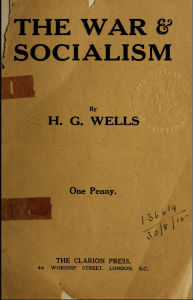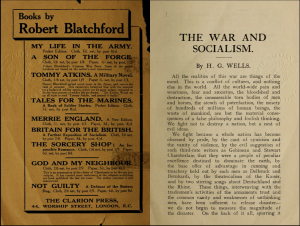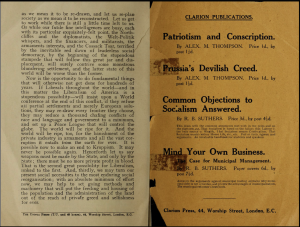A Condemnation of Capitalist Thought: H.G. Wells’s “The War and Socialism” by John L.
 Upon first glance, I immediately noticed the small pamphlet’s sepia stain, which, to my millennial eyes, indicates an old, dated text. In fact, this particular version of H.G. Wells’s “The War and Socialism” was published in 1920 in London by the Clarion Press. Throughout “The War and Socialism,” Wells criticizes the current capitalistic status quo and points toward socialism as the way to push the “population and the administration of the land out of the reach of private greed and selfishness [forever]” (Wells 12).
Upon first glance, I immediately noticed the small pamphlet’s sepia stain, which, to my millennial eyes, indicates an old, dated text. In fact, this particular version of H.G. Wells’s “The War and Socialism” was published in 1920 in London by the Clarion Press. Throughout “The War and Socialism,” Wells criticizes the current capitalistic status quo and points toward socialism as the way to push the “population and the administration of the land out of the reach of private greed and selfishness [forever]” (Wells 12).
Holding the original text, the size of the pamphlet changes the way in which H.G. Wells can be read and the target audience of his short stories. Notably, the pamphlet cost only one penny at its time of publication. The small size, cheap cost, and leaflet quality suggest that this particular story was crafted to be available to all audiences, rather than just the wealthy and educated elite. Furthermore, this 16-page copy of the short story opens up with a book sleeve advertising the works of Robert Blatchford, a socialist author in the 1920s. The advertisement played an important part in cementing the antiquity of the book for me. By having a promotion for an era-relevant author, this particular copy of the short story further immerses the reader in the surrounding context of the story.

With this added context, Wells’s commentary started to feel far less abstract and much more like a real condemnation. At its core, “The War and Socialism” explicitly reveals Wells’s disdain for the conventional understanding of human war, specifically attacking the profiteering of private entities from warfare. In this text, Wells staunchly supports socialism and warns of the destruction that will become inevitable due the continuation of capitalistic ideas.
It seems that Wells’s aversion towards capitalism is not unique to his non-fiction writings. In another 1901 fiction story, “A Dream of Armageddon,” Wells displays a similar distaste for capitalism; he uses the genre of science fiction to exhibit the destructive tendencies of capitalistic society. Within this story, the narrator has a conversation with a man who describes his dreams to be excruciatingly vivid, blurring the lines between reality and fiction. Wells uses this man’s dreams to warn of the potential dangers of newer, technologically advanced weapons and  the risks of capitalistic greed.
the risks of capitalistic greed.
Overall, it seems that his criticism in both his fiction and nonfiction make Wells’s opposition to capitalism warfare blatantly clear. Reading “The War & Socialism” caused me to look at “A Dream of Armageddon” in a slightly different light. Specifically, it allowed me to connect his nonfiction with his fiction, making his critique on capitalism much more germane and effective. Moreover, Wells’s stories were clearly written to reach those who would most identify with his message: low wage workers and soldiers—the common folk. Thus, these stories were meant to galvanize socialist support. These audiences would be more receptive to Wells’s agenda and would increase awareness and support for the issues that Wells addresses.










Recent Comments